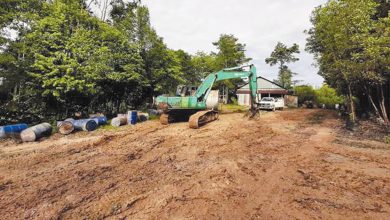Thinking Allowed: Amy’s Permaculture Farm
Last October, Ipoh Echo published a story entitled, “Amy’s Farmstay Puts Lenggong On The World Map and Boosts Perak Tourism”. It described the eviction of Amy Tan, her husband and three young children, from their farmstay in the hills overlooking Lenggong.


Hers was not just a story about a plucky young lady who wanted to share her experience of a simple life surrounded by mother nature. It was also a story about bullying by the state, neglect by those in power, the destructive Little Napoleons and the unseen hands of big business.
Many people were inspired by Amy’s ability to remain positive, persevere, and have the confidence to continue with her permaculture dream, despite continual resistance from the authorities (and the police).
More importantly, many wanted to know more about permaculture. They were curious about Amy’s, and her husband’s, move from the city, leaving the rat race behind them. A few people wondered if they were depriving their children of company, of social interaction and modern amenities.
Amy explains the concept behind permaculture and the effects on her family, in Part I; and in Part II, shows the impact of permaculture on the community, climate change and the environment.
Mariam Mokhtar: Most people had not heard of permaculture until they read about your eviction. What is permaculture?
Amy: Permaculture is a combination of two words “permanent” and “agriculture”. In simple terms, it means cultivating land in a way that preserves and enhances its fertility, without destroying its long-term productivity.
2. What are the principles of permaculture?
Amy: The main idea is to mimic nature’s cycles, observe the characteristics of the land, the design agriculture and living systems which will not deplete its resources.
For example, if the terrain is hilly, the last thing that should be done is to scrape it clean, which is how it is mostly done in Malaysia, unfortunately. This destabilizes the soil and washes away the rich topsoil.
The permaculture way starts with observation. Where there are natural land depressions, swamps will appear and these could be potential fish ponds. We observe the direction of flow of water during rainfall, and channel the water, to prevent erosion.
3. What do you find fascinating about permaculture?
Amy: Permaculture is becoming extremely popular because it is a system that preserves nature, not destroy it.
It advocates natural farming, using compost instead of chemicals. It preserves the natural environment for biodiversity and allows us to grow our own food sustainably.
It is essentially living in harmony with the land, where humans feed the land and harvest its bounty.
4. You were prepared to dedicate the lives of your family to permaculture. Why?
Amy: We realised that our urban way of life was unhealthy and was not sustainable – environmentally or personally. No matter how well we eat or how much money was spent on organic food and water purification systems, the nature of an urban lifestyle was the cause of long-term health issues, mostly caused by stress.
We wanted to create a more meaningful life for ourselves and combine our passion and energy into something that inspires us every day.
5. What does permaculture mean for your husband, Ladia?
Amy: Ladia is passionate about plants and their medicinal properties. He is in awe of the way in which animals and plants exist symbiotically. He is passionate to show others that sustainable farming does not require a huge investment.
6. What about for you?
Amy: I am passionate about seeking answers to how our bodies can remain healthy. Whilst working as a Pilates teacher and rolfing practitioner, I saw a pattern of illnesses and chronic conditions suffered by many people and I witnessed that those who were closer to nature, obtained the best recovery.
The natural environment is healing. Nature heals and is the most powerful and free healer. That explains the popularity of “forest bathing”.
7. How has permaculture benefited your children?
Amy: We decided that there was no better place to raise our children, in an environment and lifestyle that puts them in close contact with nature. There is something new every day to put us in awe of its magic.
8. How did permaculture enhance your role as parents?
Amy: We raise our children with the values to which we subscribe ourselves. We don’t expect them to continue this lifestyle as adults, but we believe strongly that a childhood in nature builds the strongest emotional resilience and this will make adult life bearable and well-grounded.
9. How different is permaculture from organic farming?
Amy: Commercial organic farming can mean having a conventional farm which uses organic fertilizers and pesticides instead of chemical ones.
Permaculture is more a lifestyle and community-driven effort and is not usually aimed at large commercially driven farms. It is about self-sufficiency and in this respect, permaculture is very suited for our kampung settings.
10. Do you have surplus crops and what do you do with them?
Amy: We share our surplus crops with family and friends or find ways to use them. For example, after a big harvest of bananas, we will spend a few days making jam, which can be preserved for the next six months. Herbs are processed into tinctures, handmade soaps and herbal oils.
NB: Don’t forget to read Part II of “Amy’s Permaculture Farm”, in the next issue of Ipoh Echo, to see how permaculture affects the community and environment.
Source:


